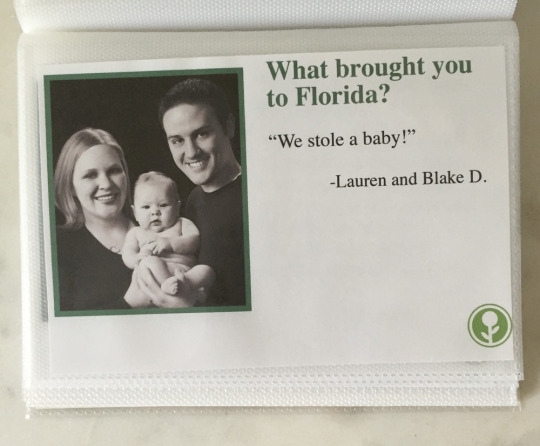A little place for me to submit my work and things I find interesting to you.
Don't wanna be here? Send us removal request.
Quote
It's good it ends here. She's probably pregnant, and the dude's obviously a drifter.
Blake on Dirty Dancing
8 notes
·
View notes
Photo
When BAE tries to help you fix things.

“Listen, I’m gonna stick around for a while. I think you might need me.” “Stick around?” “Yeah. The team can handle one case without me. It’ll be fine.” “Honey, I know you love me, but the prospect of you whirling around here trying to fix… this… is actually more frightening than getting shot.”
3x10, “True Night”
18 notes
·
View notes
Photo

When the world deserves it.
3 notes
·
View notes
Photo










I left this fake guest book at a Florida Airbnb. See a bonus page on Facebook.
156K notes
·
View notes
Link
What a delightfully fantastic, simple, and poetic vocabulary lesson.
1 note
·
View note
Text
When I’m about to leave the office and get hit with an “urgent” email from my boss

288 notes
·
View notes
Link

If your four main food groups are Cheetos, Budweiser, Cough Syrup, and Meth, I’m pretty sure I give exactly zero fucks about who you’re endorsing for President. Do better, GQ.
322 notes
·
View notes
Photo

This is the only accurate visual representation of how it feels.
0 notes
Photo
It’s been a while since I’ve seen Smokey. Now, he is taking it to a whole new level.

67K notes
·
View notes
Photo
This is my life.









Cat Hoarders
326K notes
·
View notes
Text
The Choice Ahead: A Private Health-Insurance Monopoly or a Single Payer
The Supreme Court’s recent blessing of Obamacare has precipitated a rush among the nation’s biggest health insurers to consolidate into two or three behemoths.
The result will be good for their shareholders and executives, but bad for the rest of us – who will pay through the nose for the health insurance we need.
We have another choice, but before I get to it let me give you some background.
Last week, Aetna announced it would spend $35 billion to buy rival Humana in a deal that will create the second-largest health insurer in the nation, with 33 million members.
The combination will claim a large share of the insurance market in many states – 88 percent in Kansas and 58 percent in Iowa, for example.
A week before Aetna’s announcement, Anthem disclosed its $47 billion offer for giant insurer Cigna. If the deal goes through, the combined firm will become the largest health insurer in America.
Meanwhile, middle-sized and small insurers are being gobbled up. Centene just announced a $6.3 billion deal to acquire Health Net. Earlier this year Anthem bought Simply Healthcare Holdings for $800 million.
Executives say these combinations will make their companies more efficient, allowing them to gain economies of scale and squeeze waste out of the system.
This is what big companies always say when they acquire rivals.
Their real purpose is to give the giant health insurers more bargaining leverage over employees, consumers, state regulators, and healthcare providers (which have also been consolidating).
The big health insurers have money to make these acquisitions because their Medicare businesses have been growing and Obamacare is bringing in hundreds of thousands of new customers. They’ve also been cutting payrolls and squeezing more work out of their employees.
This is also why their stock values have skyrocketed. A few months ago the Standard & Poor’s (S&P) 500 Managed Health Care Index hit its highest level in more than twenty years. Since 2010, the biggest for-profit insurers have outperformed the entire S&P 500.
Insurers are seeking rate hikes of 20 to 40 percent for next year because they think they already have enough economic and political clout to get them.
That’s not what they’re telling federal and state regulators, of course. They say rate increases are necessary because people enrolling in Obamacare are sicker than they expected, and they’re losing money.
Remember, this an industry with rising share values and wads of cash for mergers and acquisitions.
It also has enough dough to bestow huge pay packages on its top executives. The CEOs of the five largest for-profit health insurance companies each raked in $10 to $15 million last year.
After the mergers, the biggest insurers will have even larger profits, higher share values, and fatter pay packages for their top brass.
There’s abundant evidence that when health insurers merge, premiums rise. For example, Leemore Dafny, a professor at the Kellogg School of Management at Northwestern University, and her two co-authors, found that after Aetna merged with Prudential HealthCare in 1999, premiums rose 7 percent higher than had the merger not occurred.
The problem isn’t Obamacare. The real problem is the current patchwork of state insurance regulations, insurance commissioners, and federal regulators can’t stop the tidal wave of mergers, or limit the economic and political power of the emerging giants.
Which is why, ultimately, American will have to make a choice.
If we continue in the direction we’re headed we’ll soon have a health insurance system dominated by two or three mammoth for-profit corporations capable of squeezing employees and consumers for all they’re worth – and handing over the profits to their shareholders and executives.
The alternative is a government-run single payer system – such as is in place in almost every other advanced economy – dedicated to lower premiums and better care.
Which do you prefer?
424 notes
·
View notes
Photo

Fitting, given the current sociopolitical climate in America.
0 notes
Text
Protecting Gay Rights & Religious Freedom in a Nutshell
I say this with sincere love to my many friends who are passionate fundamentalist Christians who believe that the SCOTUS’s decision yesterday on marriage equality is an abomination to themselves and to God: As a lawyer, I need to attempt to set the record straight.
Our country was created by our founding fathers very deliberately to prevent the establishment of a national religion from our governance. The Church - Catholic or Anglican - was central to almost every other country in the world historically, especially England from which our founding fathers separated. It was critical to our founding fathers that one central religion NOT be declared and NOT be incorporated into our Constitution or governance. They understood that an establishment of a national religion would ultimately abridge the very rights they believed were fundamental and were meant to be recognized and protected by the Bill of Rights and ultimately the Constitution.
Religion-based loss of basic rights had been their experience in England and they wanted to prevent that here.
The fact is that this decision yesterday was a LEGAL decision about the scope of our Constitutional rights as humans and US citizens. It was not about religion, religious beliefs or religious freedom. It is about equal rights, just as the decision in this country to give women the vote and the decision to abolish slavery were about equal rights. Any decision regarding the scope of a constitutional right (whether passed by Congress or interpreted by the SCOTUS) is a legal decision, not one based in religion or morality.
Rights are not and should not be up for a popular vote or up to the states to determine. Rights are absolute and cannot be dependent upon anything other than the fact that the person is a human being and is a citizen of the US. If those two conditions are met, YOUR belief system about what is MORALLY or spiritually right or wrong does not matter and should not. You should be glad that is the case, because it would be just as easy for another religion to take over and curtail your rights as a Christian (something that has happened throughout history).
In fact, one religious party believing they know the truth for all humans is how terrible oppression starts - that is how Naziism started, the Crusades, the Inquisition, the Salem Witch Trials, the Klu Klux Klan, Al-Qaeda and now ISIS - the most destructive, hateful, murderous periods of human history have arisen directly out of one religious group (ironically, most of these examples were lead by Christians) believing their religion and religious beliefs were THE truth, and therefore they had the right to take away the rights (and lives) of those who lived or believed differently than them.
Our founding fathers wanted to prevent that outcome. So does our current Supreme Court. THAT is the law of the land and I could not be more grateful to be an American than when human rights are protected. I don’t have to agree with you to believe with all my heart and soul that YOUR rights to life, liberty and the pursuit of happiness should be protected against oppression or prejudice. LGBT US citizens deserve exactly the same treatment. God Bless America.
p.s. Those railing against the decision of marriage equality as a basic constitutional right are confusing the idea of constitutional (i.e human) rights with certain types of behavior (the stuff they call “sin”). But human rights are inherent in all human beings and US citizens - not doled out based on who is behaving “well” and who isn’t. All US citizens should have the equal right to pursue life, liberty and happiness, regardless of the “sins” they commit. The only behavior that should curtail your constitutional rights is if you commit a crime (a felony) and are convicted. But even then, criminals can still marry, have kids, own property, work and live in our communities. The only things they can’t do is vote and carry firearms. If committing a sin was a barrier to receiving basic constitutional rights in this country, we would all be in big trouble, not just the LGBT community.
-Jessica Eaves Mathews
0 notes
Photo

This makes my day.
1 note
·
View note

